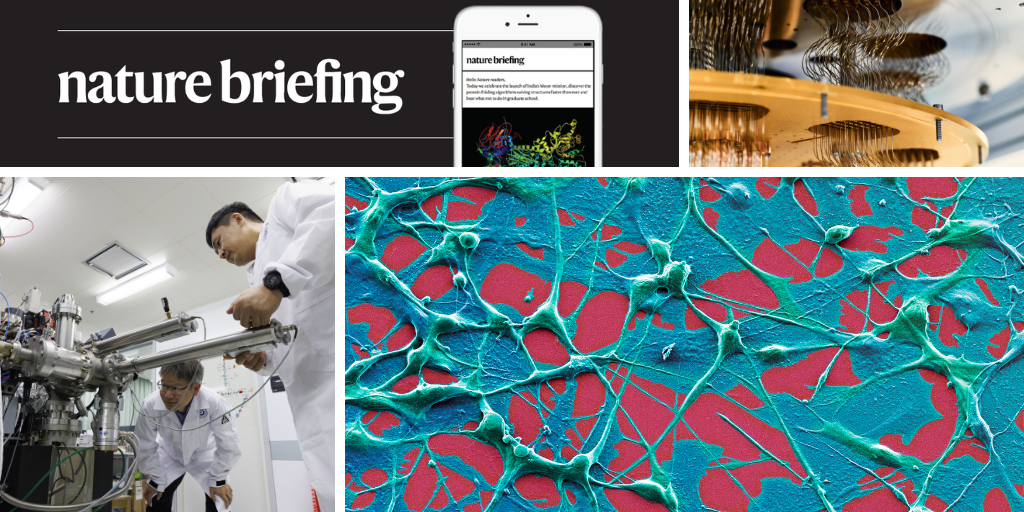You have full access to this article via your institution.
Hello Nature readers, would you like to get this Briefing in your inbox free every day? Sign up here.
Melanoma cells (artificially coloured). An immune-based therapy was more effective against this cancer in people who received an mRNA-based COVID-19 vaccine within 100 days of the start of their cancer treatment.Credit: Steve Gschmeissner/SPL
The immune-boosting effect of mRNA-based COVID-19 vaccines seems to increase the effectiveness of cancer therapies called immune checkpoint inhibitors (ICIs). Researchers found that people being treated for certain deadly cancers lived longer if they had received an mRNA-based COVID-19 vaccine than if they hadn’t. When they investigated this phenomenon in mice, the team found that the vaccines ‘revved up’ the immune system throughout the animals’ whole body, which made ICIs more effective.
Fragments of a rare type of meteorite have been discovered in the first samples from the Moon’s far side, brought back by China’s Chang’e-6 mission last year. The debris resembles material from asteroids that carry dust pre-dating the Solar System, so analysing it could help to trace how asteroids seeded Earth with volatile compounds, including water.
Reference: Proceedings of the National Academy of Sciences paper
Researchers at Google have made a fresh claim of quantum advantage — the ability of quantum computers to radically speed up calculations compared with their classical counterparts. This latest algorithm — dubbed quantum echoes — has the potential to solve scientific problems such as deriving the structure of molecules, say the researchers. But some others are cautious of the claim, and think the promise of practical use is premature. “The burden of proof should be high,” says quantum physicist Dries Sels.
Features & opinion
Studying ancient RNA could give researchers insight into the history of diseases caused by viruses with RNA genomes, such as influenza. But RNA degrades more easily than DNA, which means that scientists have sequenced very little RNA that’s more than 100 years old. Evolutionary biologist Sébastien Calvignac-Spencer wants to change that. His search has taken him to the Norwegian archipelago of Svalbard, where he hopes that the islands’ cold, dry permafrost has kept ancient virus RNA intact, just waiting to be discovered — and sequenced.
The confidence of artificial intelligence (AI) tools in their output, even when they’re wrong, could have dangerous consequences in a medical setting, says clinician-scientist Leo Anthony Celi. He suggests that two fundamental virtues be baked into AI architecture: curiosity, so tools can investigate their own ability to adequately respond to prompts, and humility, to acknowledge their shortcomings. “The future of clinical AI is not about creating sophisticated automata that replace human judgment. We need systems that amplify the human capacity for ethical reasoning, nuanced judgment and compassionate care,” he writes.
For many, falling asleep can be as straightforward as closing their eyes and drifting off. But for the brain, the transition between wakefulness and sleep is far from simple. Sleep is “much more of a spectrum than it is a category,” says sleep researcher Laura Lewis. Unpicking exactly how the brain shifts into standby, and what happens when things go awry, could reveal the causes of disorders such as sleep paralysis, and why an in-between state, called hypnagogia, appears to boost creativity.
Today I’m giggling at the finalists of the 2025 Nikon Comedy Wildlife Awards. From what appears to be a frog-on-frog baptism, to a monitor lizard fight reframed as a loving cuddle, the snaps show us the wonders of nature through a light-hearted lens.
Let me know which you’d vote for, plus any feedback on this newsletter, at briefing@nature.com.
Thanks for reading,
Jacob Smith, associate editor, Nature Briefing
With contributions by Flora Graham
• Nature Briefing: Careers — insights, advice and award-winning journalism to help you optimize your working life
• Nature Briefing: Microbiology — the most abundant living entities on our planet — microorganisms — and the role they play in health, the environment and food systems
• Nature Briefing: Anthropocene — climate change, biodiversity, sustainability and geoengineering
• Nature Briefing: AI & Robotics — 100% written by humans, of course
• Nature Briefing: Cancer — a weekly newsletter written with cancer researchers in mind
• Nature Briefing: Translational Research — covers biotechnology, drug discovery and pharma

